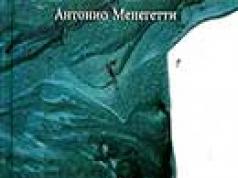Critique of Practical Reason Immanuel Kant
(No ratings yet)
 Title: Critique of Practical Reason
Title: Critique of Practical Reason
Author: Immanuel Kant
Year: 1788
Genre: Philosophy, Foreign classics, Foreign educational literature, Literature of the 18th century
About the book Critique of Practical Reason by Immanuel Kant
The Critique of Practical Reason is one of the three main philosophical writings Immanuel Kant. Previously written "Criticism pure mind» Studied the cognitive capabilities of the mind. The Critique of Constriction, the final part of the trilogy, puts the concept of expediency at the center of the discussion and is devoted mainly to questions of aesthetics and theology. "Critique of Practical Reason" is the main ethical work of the philosopher.
Immanuel Kant believed that ethics is an important part of understanding human existence, so he devoted a whole volume to it in his trilogy. The philosopher considered a set of concepts that a person calls ethics, and refuted the widespread idea that ethics is based on the pursuit of happiness. This idea has been known since the time of Aristotle, who recognized that a person finds moral that which leads mankind to happiness. This need regulates human behavior. German philosopher argues that in fact ethics is based on the desire to be worthy of happiness, and not just to have it for granted.
But what then is the difference between these two concepts? Explaining this, the philosopher considers the concept of doing duty in his book Critique of Practical Reason. That is, not coercion, but a sincere desire to fulfill a duty. Kant described this function as the highest principle of morality, called the categorical imperative. According to the teachings of the philosopher, duty is characterized, first of all, by disinterestedness. Here comes to light important difference with other manifestations of duty as a social phenomenon. Debt can be a hypothetical imperative. This means that a person can perform a duty only because it is useful to him. In this case, the fulfillment of duty will not make a person worthy of happiness, and his actions will not always be ethical. Immanuel Kant illustrates his work with quotes from the works of British philosophers, but does not always agree with them. Instead, he gives his understanding of duty and engages in polemics with his colleagues.
Emmanuel Kant's book Critique of Practical Reason reveals some of the mysteries of the human mind. Simply put, you can understand why we act in certain ways in different situations why there is a sense of duty, what is ethics for each and how it manifests itself. The book was written a very long time ago and in some ways, perhaps, it is already outdated, but people inherently do not change, therefore, everyone can find answers to a variety of questions here.
The expression “sense of duty” familiar to us is absent in the Critique of Practical Reason: the philosopher believes that duty cannot be a feeling. Understanding about it arises earlier than experience, and subsequent actions of a person are built on it. At the same time, duty in the ethical interpretation of the author is a manifestation of free will. The fulfillment of duty is valuable in itself and does not need additional rewards.
On our site about books, you can download the site for free without registration or read online book"Critique of Practical Reason" by Immanuel Kant in epub, fb2, txt, rtf, pdf formats for iPad, iPhone, Android and Kindle. The book will give you a lot of pleasant moments and a real pleasure to read. Buy full version you can have our partner. Also, here you will find the latest news from the literary world, learn the biography of your favorite authors. For beginner writers there is a separate section with useful tips and recommendations, interesting articles, thanks to which you yourself can try your hand at writing.
Quotes from the book Critique of Practical Reason by Immanuel Kant
Indeed, if there were no lower concepts, then there would be no higher concepts.
... the duty of philosophy was to destroy the illusions that arose from false interpretations, even at the cost of losing many recognized and beloved fictions.
Immanuel Kant (1724–1804)
Critique of Pure Reason (1781 - first edition, 1787 - second)
Preface to the second edition
Whether the knowledge operated by the mind is developed on the right path of science or not can be easily ascertained from the results. If this development, after careful preparation and equipment, finds itself in a dead end as soon as it reaches the goal, or, in order to achieve this goal, is forced to go back more than once and break new paths, and if it is not possible to achieve unanimity of various researchers on how to realize the common goal, - then after all this it can be said with certainty that such a study has by no means entered the right path of science, but operates only by groping. Therefore, it would be a merit before the mind to find such a path as far as possible, even if it were necessary to discard as something useless some of what was contained in the previously rashly set goal.
That logic, from the earliest times, has taken this right path, is evident from the fact that since Aristotle, it has not had to take a single step back, except as an improvement in the elimination of some unnecessary subtleties and a clearer presentation, related more to elegance than to certainty, of science. . It is also noteworthy that she still could not take a single step forward and, apparently, she seems to be a science completely finished and complete. In fact, some of the latest researchers have proposed to expand logic by including in it psychological sections about various cognitive abilities(imagination, wit), then metaphysical sections on the origin of knowledge or on various types of certainty depending on the object (idealism, skepticism, etc.), then anthropological sections on prejudices (about the causes of their occurrence and the means against them). However, such attempts are explained by ignorance of the true nature of this science. The confusion of the boundaries of the various sciences leads not to the expansion of these sciences, but to their distortion. The boundaries of logic are precisely determined by the fact that it is a science that sets out in detail and strictly proves only the formal rules of all thinking (it makes no difference whether it is a priori or empirical, it makes no difference what its origin and object are, and whether it encounters accidental or natural obstacles in our soul. ).
Logic owes its success to the definiteness of its limits, thanks to which it has the right and even must abstract itself from all objects of knowledge and the differences between them; therefore, in it the understanding deals only with itself and with its form. Of course, it was much more difficult for the mind to pave the right path of science, since it deals not only with itself, but also with objects. That is why logic, as propaedeutics, is, as it were, only the threshold of science, and when it comes to knowledge, then logic, it is true, is supposed to judge them, but in order to acquire them, one should turn to the sciences about objects proper.
Since there must be reason in these sciences, then something in them must be known a priori, and therefore knowledge by reason can relate to its object in two ways, namely: either simply determine this object and its concept (which must be given in another way) or make it valid. The first means theoretical, and the second - practical knowledge of the mind. In both spheres, it is necessary to preliminarily state, no matter how large or small the volume, the section of pure knowledge, i.e. that section in which reason determines its subject entirely a priori, and not to confuse with it what is obtained from other sources. A bad economy is one in which money is spent without accountability, so that later, when the economy is in a state of stagnation, it will no longer be possible to determine how much of the income can cover expenses and how much of the expenses should be reduced.
Mathematics and physics are two theoretical areas of cognition by the mind, which must determine their objects a priori, the first completely purely, and the second purely at least in part, and then also according to sources of knowledge other than reason.
From the earliest times, to which the history of the human mind extends, mathematics took the right path of science with the admirable ancient Greeks. However, one should not think that mathematics found or, rather, created this royal path for itself as easily as logic, in which reason deals only with itself; on the contrary, I believe that it groped for a long time (especially among the ancient Egyptians), and a change tantamount to a revolution occurred in mathematics due to someone's lucky guess, after which it was no longer possible not to see the necessary direction, and the right path of science was laid and destined for all time and in the infinite distance. For us, the history of this revolution in a way of thinking, much more important than the opening of the way around the famous cape, has not been preserved, nor has the name of the lucky man who brought about this revolution been preserved. However, the legend transmitted to us by Diogenes Laertes, who reports the name of the alleged inventor of the insignificant, supposedly not even requiring proof, elements of geometric demonstrations, shows that the memory of the changes caused by the first signs of the discovery of this new path seemed extremely important in the eyes of mathematicians and therefore left an indelible mark on their minds. But the light was revealed to the one who first proved the isosceles triangle theorem (it makes no difference whether it was Thales or someone else); he realized that his task was not to investigate what he saw in the figure or in its mere concept, as if reading its properties in it, but to create a figure by means of what he himself a priori, in accordance with the concepts mentally invested in it and showed (by construction). He realized that he could have true a priori knowledge about something only if he attributed to the thing only what necessarily follows from what he himself put into it in accordance with his concept.
Natural science found its way onto the main road of science much later. Only a century and a half ago, the suggestion of the insightful Bacon of Verulam was partly the cause of the discovery [of this path], and partly the impetus that moved natural science forward, since traces of it had already been found; it can also be explained only by the rapid revolution in the way of thinking. I will have in mind here natural science only insofar as it is based on empirical principles.
Clarity for all naturalists arose when Galileo began to roll balls with a weight of his own chosen from an inclined plane, when Torricelli forced air to support a weight that, as he foresaw in advance, was equal to the weight of a column of water known to him, or when Stahl, in an even later time turned metals into lime and lime back into metals, extracting something from them and adding them back to them. The naturalists realized that the mind sees only what it creates according to its own plan, that it, with the principles of its judgments, must go ahead, according to constant laws, and force nature to answer its questions, and not drag along as if on a leash, since in otherwise, observations made by chance, without a preconceived plan, will not be bound by a necessary law, while the mind seeks and needs such a law. Reason must approach nature, on the one hand, with its principles, only in accordance with which phenomena that are consistent with each other can have the force of laws, and, on the other hand, with experiments invented in accordance with these principles in order to draw knowledge from nature, but not like a schoolboy, to whom the teacher tells him everything he wants, but like a judge, forcing the witness to answer the questions he proposes. Therefore, even physics owes the revolution so favorable to it in the way of its thinking solely to [happy] conjecture - in accordance with what the mind itself puts into nature, to seek (and not invent) in it what it must learn from it and what it I wouldn't have known on my own. Thus, natural science entered for the first time on the right path of science after having groped for many centuries.
Metaphysics, a completely isolated speculative knowledge of the mind, which rises entirely above knowledge from experience, namely, knowledge by means of concepts alone (but without applying them to intuition, as in mathematics), and in which the mind, therefore, must be only its own student, - has not yet enjoyed the favor of fate and has not yet been able to embark on the right path of science, despite the fact that it is older than all other sciences and would be preserved even if all the other [sciences] were defeated by all-destroying barbarism. In metaphysics, the mind is constantly in a state of stagnation, even when it tries to see a priori (as it thinks it right) the laws that are confirmed by the most ordinary experience. In metaphysics, one has to go back countless times, because it turns out that the path [chosen before] does not lead to where we wanted. As for the unanimity in the views of the supporters of metaphysics, it is still so far from it that it rather resembles an arena, as if adapted only for wrestling exercises, an arena in which not a single fighter has ever won a place for himself and could not secure his victory. solid haven. Therefore, there is no doubt that metaphysics has hitherto operated only gropingly and, worst of all, has operated only with concepts. What is the reason why the right path of science has not yet been found here? Maybe it's impossible to find it? But then why did nature endow our minds with a relentless striving to seek such a path as one of the most important affairs of the mind? Moreover, how little reason do we have to trust reason if it not only leaves us in critical area our curiosity, but also lures us with false promises in order to deceive us in the end! Or, if up to now reason has only been mistaken, what indications give us, when we resume our investigation, reason to hope that we will be happier than our predecessors?
founder German philosophy considered to be Immanuel Kant. He came from a religious family, entered the faculty of theology, but at the university he became interested in philosophy and the exact sciences. Subsequently, he became a professor of philosophy and logic. One of his most important works is the Critique of Pure Reason. In this work, he seeks and evaluates the sources scientific knowledge, their principles and possibilities.
Humanity has gone through many stages in its development. What could be perceived as heresy a few centuries ago is now considered absolutely normal. to the human mind tend to look for answers to many questions. He almost always gets to the point where explanation becomes impossible with practical point vision. Then a person begins to make assumptions, build theories. The philosopher draws the line between reason and reason. The mind is able to draw conclusions on the basis of practical knowledge, to adjust the new to the already known data, while the mind is able to suggest something new, yet inexplicable. Thus, Kant shows that the mind is far superior in its capabilities to reason. Reason has certain limits.
Thus, one of Kant's provisions is that experience cannot be considered a source of reliable knowledge, since the existence of processes that are not yet known to us is possible. However, theories and hypotheses also cannot be such a reliable source, since they have no evidence. In his work, Kant explores the possibilities of several sciences in obtaining reliable information: mathematics, natural science, religion, aesthetics, and others. He expresses his opinion about what can be taken as the basis of knowledge.
The book will be useful to those who are seriously interested in philosophy, who want to study the works of Immanuel Kant, the features of thinking and the theory of knowledge.
On our site you can download the book "Critique of Pure Reason" by Immanuel Kant for free and without registration in fb2, rtf, epub, pdf, txt format, read the book online or buy the book in the online store.








